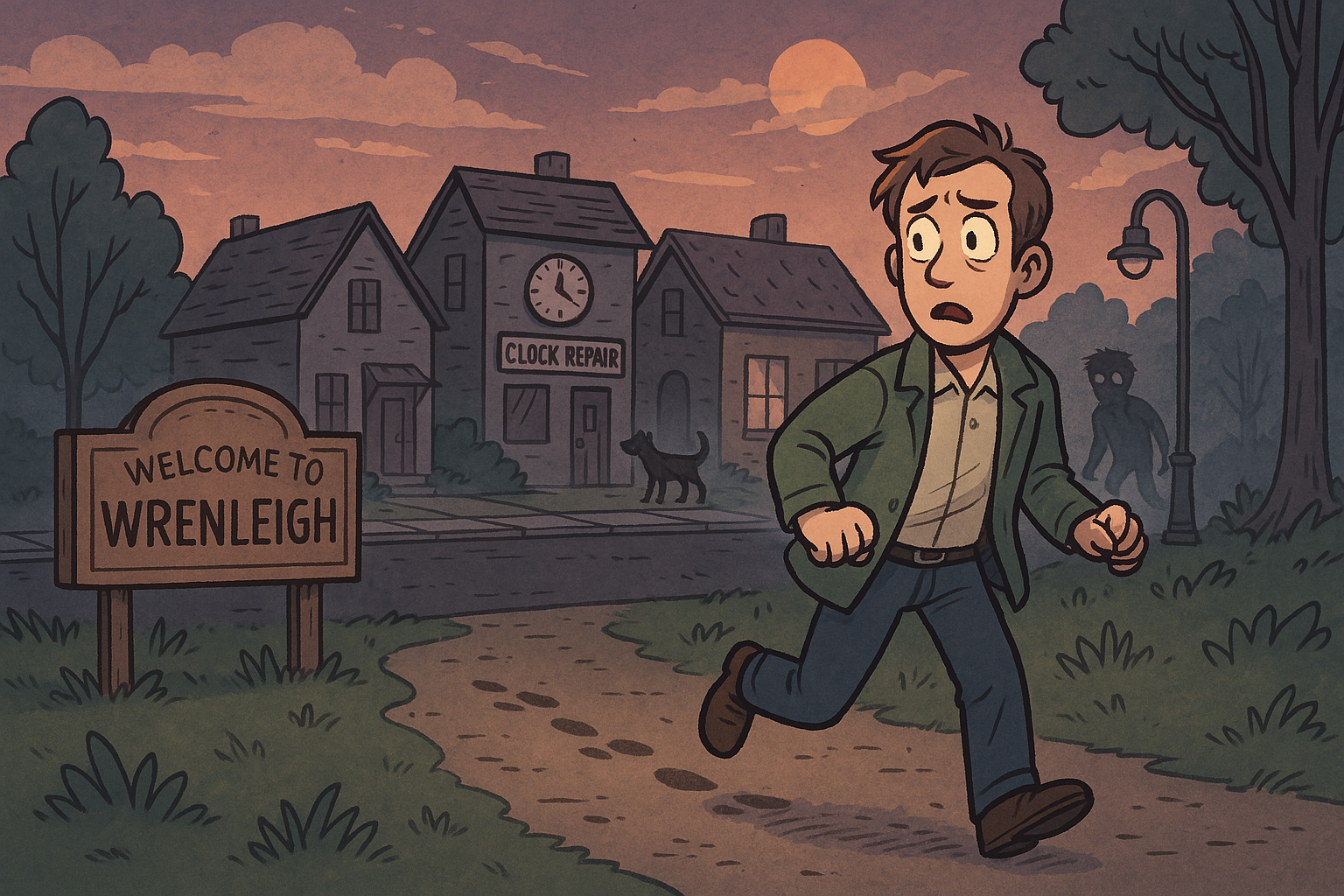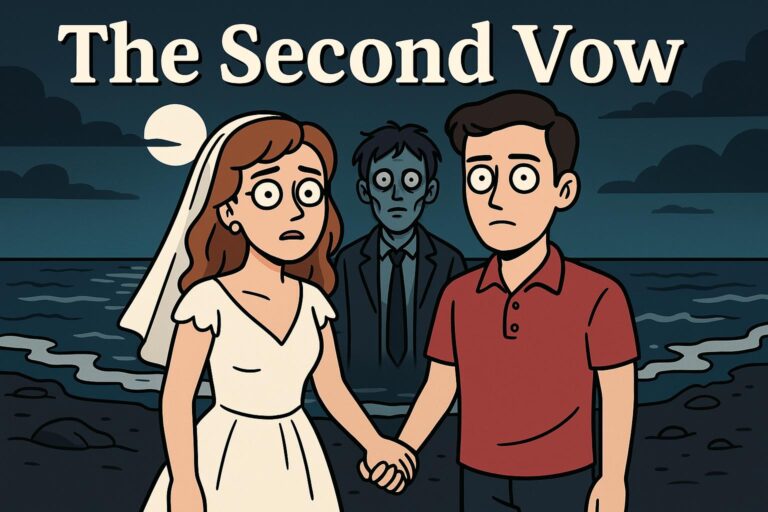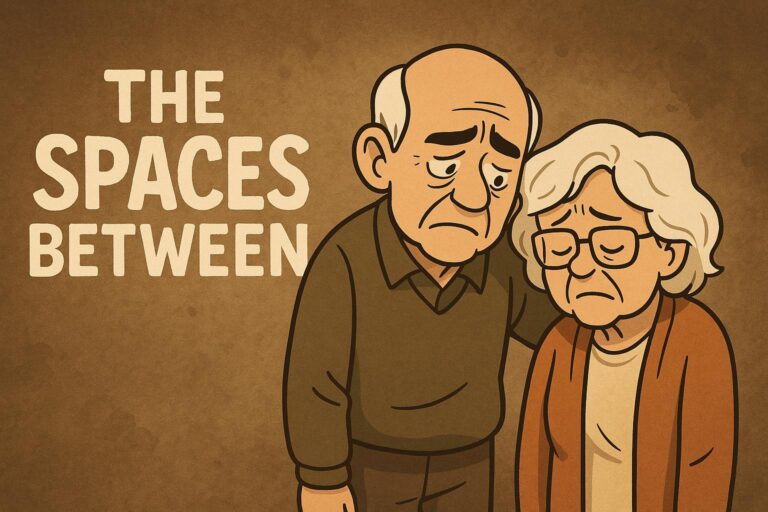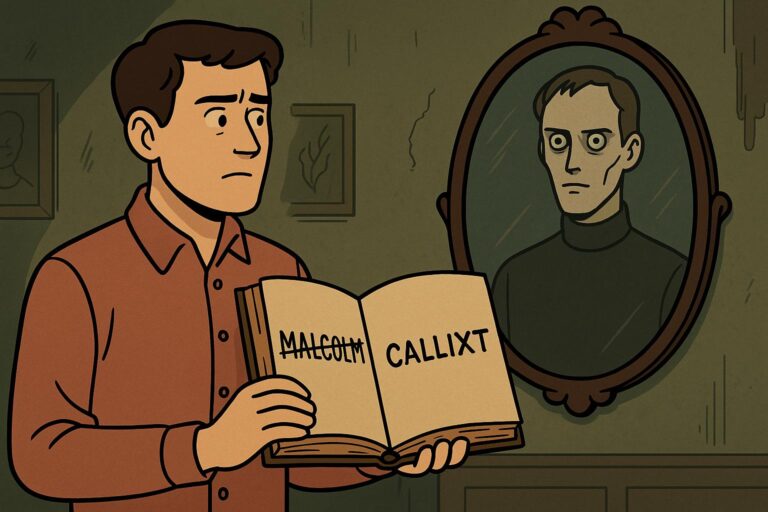Crave My Footsteps

On the second Tuesday of October, the town of Wrenleigh fell silent just before dusk.
It wasn’t the kind of silence that comes when the wind dies or the birds pause between songs. No—this was a listening silence, a communal intake of breath. Even the dogs, usually restless in their yards, stood frozen with their ears perked toward the darkening streets.
The footsteps had begun.
It started with Mrs. Alden, the retired librarian who lived above the florist’s. She was known for her afternoon walks, always at four on the dot, always the same loop. She told her daughter over tea, a tremor in her hand, that she heard her own steps—but doubled.
“They weren’t mine,” she said, eyes wide. “A few seconds behind. Not quite in sync, but almost. Like an echo… but heavier. Like someone’s copying me. Someone heavier, slower, dying.”
Her daughter laughed. “You’re getting spooked in your old age.”
By Thursday, ten more people had reported it—postman, butcher, two high schoolers, a priest. The steps followed only them. No one else could hear them, even when standing right beside the afflicted. They were private, personalized. Whisper-close. The kind of thing that got inside your skull and scraped.
At first, people tried to rationalize it. Old pipes, the slap of their own heels bouncing off the buildings. But the echoes began happening on gravel paths and in the woods, places where no sound should return. Some claimed they caught a glimpse—just a flicker in the corner of the eye—of a silhouette ducking around a corner, stepping into the fog.
By Saturday, Wrenleigh had become a town of haunted walkers.
No one talked about it in public. You could see it, though. The way people walked faster, glancing behind themselves without turning their heads. Some had stopped walking entirely. Some had left town altogether.
And some—like Elias Granger—had decided to follow the footsteps back.
Elias lived on the edge of Wrenleigh, where the town spilled into black trees and the land folded like draped cloth. He was thirty-four, unmarried, and ran a clock repair shop that hadn’t seen a customer in three weeks. He was not particularly brave or superstitious. But he was curious.
He heard his footsteps for the first time on a Monday morning. Two sets: one his own, steady and quick. The other—just behind, just a bit heavier, like boots on damp stone. He paused outside the shop’s door. The sound paused too.
When he turned, there was no one there.
That night, he sat on his creaky porch and listened. The second steps came again. The same rhythm, always half a breath behind. He began walking laps in his yard, muttering measurements, trying to catch the sound out of time. It never slipped. Whatever was following him was very good at pretending.
On the third night, he changed direction mid-step.
The echo faltered.
He stopped cold, heart hammering. That had been real. Not a shadow. Not a figment. Something following. Something mimicking. And it had tripped.
He didn’t sleep that night.
On Sunday, he visited Marianne Fletcher. She was one of the only other people in town still willing to talk about it. She’d once taught folklore at the university, before retiring to Wrenleigh to escape what she called “the ruckus of progress.”
“I thought I was losing it,” she told him, pushing a cup of tea toward him. “But the steps are real. Not metaphorical. Not psychological. Real, physical echoes of something not here yet.”
“Not here yet?” Elias asked.
She nodded slowly. “I’ve been reading. Old texts. European, mostly. There’s precedent for this sort of thing. Premonitory echoes. Some cultures believed that hearing the steps of your future self was an omen—especially if they came from behind.”
“Why behind?”
“Because behind means you haven’t caught up to the moment yet. The moment of death.”
He flinched at that, but didn’t speak. Marianne watched him closely.
“There’s something else,” she said. “People are changing. Subtly. Have you noticed?”
He had. Henry, the butcher, no longer took the left route home. Sarah Melby had stopped baking entirely, despite it being her livelihood. People were feeling their way toward something—without knowing what. Instinct pulling them away from an unseen cliff.
“Then how do we stop it?” Elias asked.
Marianne leaned forward. Her voice was barely above a whisper.
“You don’t stop it. You change it.”
That night, Elias did something no one in town had dared yet. He followed the footsteps into the woods.
He waited until the town was asleep, the only light the dim glow of streetlamps and the blue flicker of TVs behind drawn curtains. He walked out past the apple orchards, down the trail that led into the Wrenmoor Woods. He walked slowly, deliberately.
The footsteps followed.
At one point, he stopped abruptly and spun around. This time, he didn’t see a flicker.
He saw himself.
Just for an instant—no more than a heartbeat—there he was. Or someone who looked exactly like him. Pale, haggard, with blood on his shirt and something glassy in his eyes. A mirror image, caught in a single flash of moonlight. Then gone.
He ran.
Branches whipped at his face. His lungs burned. But the sound followed—closer now. No longer perfectly timed. They gained on him. As if the future had picked up speed.
When he reached his front porch, Elias slammed the door and locked it. He stood with his back to it, trembling, as something brushed the other side.
Just one slow step.
Then nothing.
He didn’t leave his house for two days.
On the third morning, he found a note taped to his door. In delicate handwriting:
“It is not your footsteps you are hearing. It is your choice echoing forward.”
There was no signature.
The realization came in a dream—or maybe it wasn’t a dream at all. He stood in the center of town. Everyone was walking in tight, looping paths. Some wept. Some screamed. Others simply stared ahead like cattle. And from each of them: footsteps. Echoed, delayed, mismatched. But one thing connected them all.
They were walking toward something.
A single moment. A choice.
Elias awoke drenched in sweat.
By the week’s end, people had begun to die.
Quietly. Unexpectedly. A teacher choked on nothing in the middle of a lesson. A mechanic drowned in an empty tub. A girl fell from the roof of a one-story house. In each case, the family spoke of strange behavior. Sudden shifts in routine. Hushed muttering. One boy had written on his bedroom wall in charcoal:
“It caught me.”
Wrenleigh was unraveling.
And Elias had decided: he would not let it catch him.
He would find the choice before it happened.
He would change it.
Elias began keeping a journal.
He didn’t know what else to do. Something about the act of writing—of forcing thought into language—helped him keep the fear from slithering too far down. It became his ritual: each night, after checking all the locks, he would sit at the kitchen table and write everything he had done, every interaction, every path he had taken, every strange thought or flicker of déjà vu.
The footsteps continued. Never faster. Never closer. Just there. Like breath on his neck.
But the town was changing, and not subtly anymore. Curtains stayed closed in the middle of the day. Conversations trailed off the moment another person approached. Wrenleigh had become a place of watchers—each person haunted by their own invisible tether.
Some tried to talk about it. A man on the radio station, late at night, said, “I think I’ve already died. I think I’m walking backward through my own end.” The station went silent after that. The next morning, his house was found empty. Doors wide open. All his clocks smashed.
Elias didn’t talk anymore. He listened.
Because one night, something new happened.
He was sitting at his desk, rereading the entry from two nights before, when he heard the footsteps inside the house.
Not behind. Not outside. Inside.
They moved slowly down the hallway toward him. Each step deliberate. Weighted. Elias froze. His pen rolled off the table. He didn’t dare breathe.
They stopped just outside the room.
He turned, expecting to see nothing—like every other time.
But the door creaked open.
And there he was.
Himself. Older. Gaunt. Mouth slightly open, as if always about to speak. Dried blood stained the edge of his collar. His eyes were dead—not blind, but post-seeing, like whatever had looked through them no longer cared to understand.
They stared at each other for a moment.
And then the figure raised its hand and pointed to the table.
Elias turned.
There, lying beside his journal, was a newspaper article he hadn’t placed there. It was dated three days from now.
Local Man Dies in Electrical Fire – Cause Under Investigation.
His name was in the byline.
He burned the article that night, but the words stayed behind his eyes. “Electrical fire.” He checked every cord, every outlet. Nothing frayed. Nothing even warm.
But the footsteps grew louder.
Marianne wouldn’t answer her door. Her porch was cluttered with opened books, as if she’d thrown them out in a frenzy. A note was nailed to the wood:
“You cannot run from a step already taken.”
The next day, Elias unplugged everything. He even turned off the breaker and lit candles. Still, the steps echoed. Still, the breath of death crept closer.
Until he realized: it wasn’t about the fire.
It was about the choice that led to it.
And choices, unlike fate, could still be shifted.
He started mapping his days like a crime scene. He replayed everything, looking for a hinge—something small that would swing wide. He thought of Marianne’s words: “You change it.” But change what? Everything?
Then he remembered something.
Two days ago, a boy had asked him for help fixing an old transistor radio. Elias had waved him off—told him to come back next week. He’d been too consumed by his own fear.
The boy, he now recalled with horror, lived next door to the man who would die in the same fire. The one Elias had just read about.
What if that boy had tried to fix it himself? What if his attempt would spark the fire?
The echo wasn’t showing Elias his death.
It was showing him the death he would cause.
He ran.
He reached the boy’s house at dusk. The windows glowed faintly orange. A hum throbbed through the air.
Smoke curled at the edge of the roof.
“Caleb!” Elias screamed, pounding on the door. “Get out of the house!”
He didn’t wait for an answer. He threw his weight against the door until the frame gave with a crack. Inside, the living room shimmered with static. A small battery-powered radio on the carpet spat sparks. The boy stood frozen in front of it, hand outstretched.
Elias lunged, yanked him back, and flung the radio across the room.
A split-second later, the curtains caught fire.
They ran.
The house did burn—but no one died.
That night, the footsteps stopped.
No soft chase behind him. No weight pressing through space and time. Just silence. The real kind. The kind that belonged to the living.
Elias sat on his porch and wept.
But the silence didn’t last.
It was three nights later when he heard something again.
A new rhythm.
Not behind him this time.
Not chasing.
But ahead.
A soft, distant echo of himself—walking toward something unseen.
Not a death.
But a choice he had not yet made.
And somewhere in Wrenleigh, another pair of footsteps began to follow someone new.
Because echoes don’t end.
They only change direction.



